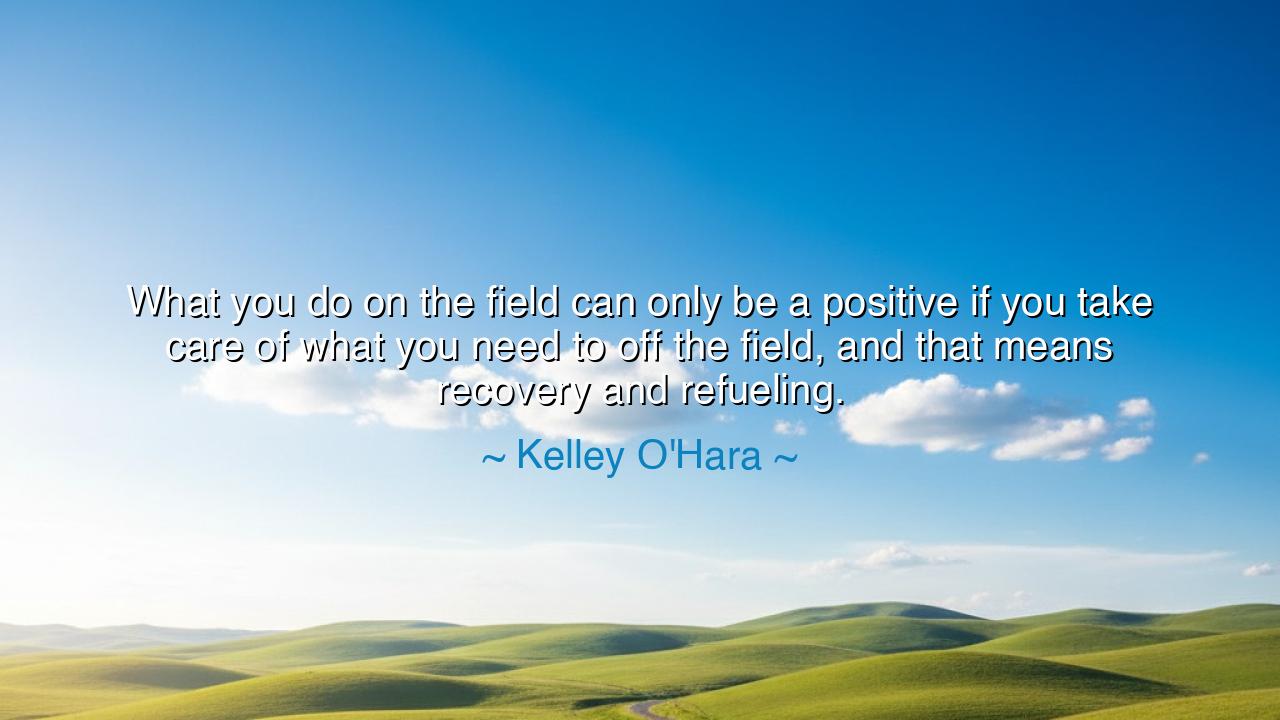
What you do on the field can only be a positive if you take care
What you do on the field can only be a positive if you take care of what you need to off the field, and that means recovery and refueling.






The words of Kelley O’Hara, “What you do on the field can only be a positive if you take care of what you need to off the field, and that means recovery and refueling,” are not merely about sport—they are about the eternal balance of action and rest, of striving and renewal. She teaches that victory is not forged in the moment of play alone, but in the unseen hours of discipline, nourishment, and preparation. The field may display the glory, but it is life beyond the field that sustains it.
The origin of such wisdom lies in the rhythm of nature itself. The soil cannot bear fruit without time to rest, nor the body rise in strength without recovery. Warriors of old knew that battle was only won when the army was fed, clothed, and given time to heal its wounds. So too, in the arena of sport and in the arena of life, triumph demands not only effort, but the humility to care for the vessel that carries the spirit.
Consider the story of Mia Hamm, one of the greatest figures in women’s soccer. Her brilliance on the field dazzled the world, yet she often spoke of the sacrifices behind the scenes: the careful training, the endless stretches, the hours of tending to injuries and rebuilding her body. Her greatness was not a miracle of talent alone, but the fruit of honoring the discipline of recovery and the necessity of refueling. Without these, even the brightest flame burns out.
O’Hara’s words are also a parable for all of life. The tasks we perform in the open—our work, our service, our creations—will only shine as long as we tend to what is hidden. To rest is not weakness; to nourish oneself is not indulgence. These are the unseen labors that make possible the public triumphs. The farmer who neglects his soil will see his harvest wither; the soul that neglects its rest will find its light dimmed.
Thus, the teaching is clear: greatness is not only the clash of effort but the wisdom of balance. The positive impact of our actions depends on the care we give to the foundations beneath them. Strength without recovery falters, fire without fuel dies, and the field without preparation yields no glory.
Let the generations remember: to run long and to shine bright, one must honor both the seen and the unseen. Labor fiercely, yes—but also rest wisely, heal deeply, and feed the body and soul. For in this balance lies not only victory in the game, but endurance in the journey of life itself.






DTLuu Dinh Thuan
Kelley O'Hara’s words hit home when thinking about how we approach success in all areas of life. It’s not just about putting in the work, but making sure we are giving ourselves what we need to sustain that work. How can we shift the narrative in our culture to emphasize recovery just as much as achievement? What strategies could individuals and teams use to make self-care a non-negotiable part of success?
HANguyen Ha Anh
I really resonate with Kelley O'Hara’s focus on recovery and refueling. In sports, it’s a given, but in everyday life, we often overlook this balance. Can we expect optimal performance without taking the necessary time to recharge? Whether through rest, healthy eating, or mental breaks, how can we make recovery a part of our routine without feeling guilty for taking that time for ourselves?
3BYen 34 Bao
Kelley O'Hara makes an important point—what happens off the field is just as crucial as performance on it. But how many of us neglect recovery in our daily lives? Whether it's athletes, professionals, or students, we often overlook how vital rest, nutrition, and mental health are for long-term success. What are some simple, sustainable habits we can adopt to ensure we’re properly fueling and recovering to maintain peak performance?
MQNguyen minh quan
Kelley O'Hara’s quote reminds me that performance is a result of both physical preparation and mental recovery. While we often focus on working hard, taking time to recover is just as important. How do we shift the mindset that recovery is a ‘luxury’ and instead treat it as a critical part of the process? In a world that rewards constant productivity, how do we create space for this necessary downtime?
HDHung duy
I love this perspective from Kelley O'Hara. It’s so easy to focus on the ‘doing’ part—pushing yourself to perform—but true success comes from balance. Recovery and refueling aren't just for athletes; they’re essential for anyone in high-pressure environments. How can we incorporate better self-care practices into our daily routines to enhance our performance in all areas of life, not just on the field or at work?